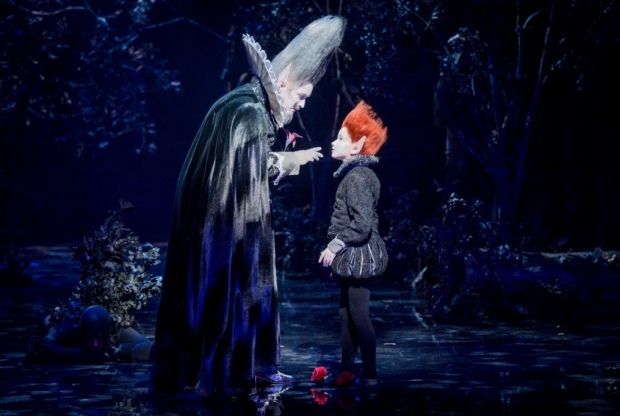Review: A Midsummer Night's Dream (Glyndebourne)

© Robert Workman
Night and silence! Who is here? Are these fireflies, brought in to fill the darkened pause between acts one and two? No. It’s a flurry of smartphones in the stalls. A great deal has changed in the world since 1981, the year Peter Hall‘s deservedly beloved production of A Midsummer Night’s Dream first saw the light of day, not all of it for the better.
This venerable staging, last seen ten years ago, is a Glyndebourne classic for good reasons. The opera, bafflingly derided by early contemporaries as minor Britten, is treated to a production that respects the composer's intentions almost to the letter. In particular the late John Bury‘s living, breathing forest designs are astonishingly sensitive to the score. What we hear is what we see, and lovers of Regietheater should avert their eyes.
While Victorian notions of fairies as insect-boys in Elizabethan ruffs are a timeless aesthetic, decking out the younger-than-usual Puck as a gonk dates the show a little. It would be easy to imagine the half-pint-sized David Evans dangling from a rear-view mirror; an impression compounded by the way he clunk-clicks before every zooming trip on his personal clump of flying flora. It’s elfin safety gone mad, but better than a plummeting pixie I suppose.
Evans is a confident and clear-voiced guide through the proceedings, and he translates Matthew Rose‘s Bottom into an ass-headed ass with unalloyed glee. The supreme Rose, an alumnus of the 2006 revival, leads a splendid company of rude mechanicals that includes David Soar (Quince), Anthony Gregory (Flute) and Colin Judson (Snout). It’s hardly their fault that Hall’s staging, ably revived here by its original choreographer, Lynne Hockney, fastidiously eschews vulgarity during the play within a play.
Mysterious beauties ripple through the score
Throughout the show, indeed, there’s a lack of earthiness. Tytania’s seduction of Bottom is a bloodless affair ("Methought I had…" opines the ex-ass… but what, exactly?) while Hall depicts the human lovers as a colourless bunch, notwithstanding some transcendent singing by Benjamin Hulett as Lysander and Elizabeth DeShong as Hermia. The umbrage with which the American mezzo splutters "Puppet?!" is a moment to savour.
A large cast that includes a superbly drilled contingent from the Trinity Boys Choir, who all but own this opera, acquits itself wonderfully well. What luxury to have Claudia Huckle for the cameo role of Hippolyta, plus the London Philharmonic Orchestra to unveil the mysterious beauties that ripple through Britten’s score. The youthful Glyndebourne stalwart Jakub Hrůša conducts in place of the indisposed Kazushi Ono, and he pinpoints moments that seldom emerge with such clarity, such as the careless trombone flicks that herald the entry of the Mechanicals.
Shakespeare’s fairy monarchs are clad in what looks like titanium—a nod to the Queen, maybe?—and both Kathleen Kim (Tytania) and Tim Mead (Oberon) sing with impeccable style. The Korean soprano is blest with coloratura glory, while Mead has a timbre similar to that of the role’s begetter in this production, the countertenor James Bowman. If only the production gave him more opportunity to explore the character’s dark side.
A Midsummer Night's Dream runs in repertory at Glyndebourne until 28 August.










